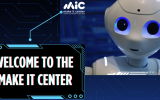Student Services

Johnson County Community College (JCCC) provides students with extensive academic support services that continue to develop to meet their needs. What follows is an overview of the services offered through JCCC’s Academic Support division, and how each program works toward a single goal of student success.
Academic Resource Center
The Academic Resource Center (ARC) offers academic support for all students in JCCC courses, including concurrent enrollment, as well as study spaces and a café. Located in a newly remodeled space in the library building since summer 2020 as part of the Facilities...
Tags:

Jackson College has been committed to providing excellent education and support to its students for over 95 years. In today's fast-paced world, college students' requirements and needs are evolving. To address these needs, Jackson College has initiated a pilot program called Harriet's Hub, which serves as a one-stop student resource center.
The name hearkens back to the college’s heritage, remembering a former faculty member, Harriet Myer, who helped college students by establishing a student assistance fund. With two rooms of dedicated space in the college’s library, the hub provides...
Tags:

Student access and success are foundational to the community college mission. The learning paradigm proposed by Barr and Tagg (1995) initiated the student success movement, which paved the way for the completion agenda in the 2000s. However, only approximately 26 percent of community college students transfer to a four-year institution (Sansing-Helton et al., 2021). The situation is even bleaker when we evaluate the STEM fields. According to the Community College Research Center (2022), low-income community college students are less likely to transfer to a STEM field, and only 14 percent of...
Tags:

Dallas College is in the barrier-busting business. Those at the college, from leadership to faculty to staff, understand that community college students are inundated with challenges in life that can often force them to decide between pursuing an education and providing for their families. Through the innovative Learner Care Model, Dallas College Student Care Network provides holistic services to ensure that basic needs are met and that students are supported as they pursue their educational goals.
From coaching to financial aid to mental health care, the institution’s learner care approach...
Tags:

Imagine a place where individuals of all ages and their families can come for the ultimate hands-on career exploration experience. At Austin Community College’s (ACC) Make It Center (MIC), the possibilities are boundless. This innovative new hub will revolutionize the way we perceive career pathways by introducing visitors to a multitude of options they may have never considered before. Through dynamic partnerships and collaborative efforts, the MIC will inform, inspire, and captivate students and community members alike, empowering them to uncover meaningful careers that align with their...

Postsecondary institutions have long recognized the importance of student success and retention, with many colleges and universities explicitly emphasizing these goals in their strategic plans (Darabi & Garland, 2018). Throughout the United States, campus learning centers, which the National College Learning Center Association defines as “interactive academic spaces which exist to reinforce and extend student learning in physical and/or virtual environments” (as cited in Darabi & Garland, 2018, p. 4), regularly contribute to success and retention efforts. Delta College, which serves...
Tags:

In 2016, a group of students sent a letter to Seattle Central College’s administrators to name a part of their identity they felt was being overlooked as they embarked on a journey that would be pivotal in determining their futures. The students, who were previously incarcerated, had chosen education as the path to restart their lives upon leaving a Washington state prison. While community and technical colleges are open access institutions, they are still institutions with barriers that are, at times, only visible to some of the most minoritized and marginalized in our communities. In...

In January 2018, 14 local school district superintendents and Jackson College’s (JC) President and CEO, Dr. Daniel J. Phelan, initiated the launch of Jackson County Early College (JCEC), designed to offer students the opportunity to earn a high school diploma and an associate degree, certification, or up to 60 college credits. This article highlights the program’s successes since its first students walked through the doors in fall 2018.
Cost Effectiveness
Since the inception of JCEC, JC has reduced tuition and fees for early college students in a variety of ways. The college capped digital...

Calhoun Community College and Drake State Community & Technical College officials have developed a partnership that will not only address learning obstacles for adult learners, but job training needs as well. Greater Opportunities for Adult Learners (GOAL) is a free program designed specifically for individuals who do not have a high school diploma and want to become more employable. Individuals who enroll in the program have access to educational resources focused on improving their reading, math, and language skills to obtain a GED, learn English as a second language, and/or earn a...
Tags:

College students who are parents, a.k.a., student-parents, have always been enrolled in community colleges, but only within the past few years have they been explicitly recognized as a distinct student group with a unique set of support needs. According to the Institute for Women’s Policy Research (2018), more than one in five postsecondary students in the U.S. is a student-parent. This holds true at Monroe Community College (MCC), where 21.4 percent of students enrolled in 2019-2020 had children under age 18 (DeMario, 2021).
Student-Parent Risk Factors
Figure 1 shows that MCC’s student-...
Tags:

The Hispanic Association of Colleges & Universities (HACU) recently designated Polk State College as a Hispanic-Serving Institution (HSI), as the college’s Hispanic student population has reached 26 percent and continues to grow. Additionally, Polk State is now eligible for Title V and HSI STEM federal grant funds that support institutions that enroll large proportions of minority and financially disadvantaged students. The college will apply for these funds through the U.S Department of Education to further support students.
Equity and a presence in underserved communities with targeted...
Tags:

Almost half of U.S. community college students responding to the #RealCollege survey conducted by The Hope Center for College, Community and Justice indicated that they had experienced food insecurity within the 30 days before completing the survey (Goldrick-Rab et al., 2019). In response, an increasing number of community colleges are working to eliminate food insecurity for students and their families. Through programs such as on-campus food pantries, community gardens, farmers’ markets, and food scholarships, colleges are finding solutions for students and, in some cases, staff who are...

In fiscal year 2019-2020, Sinclair Community College (Sinclair) received $10,000 from StrivePartnership Cincinnati and Learn to Earn Dayton to develop and implement a strategic communication plan to reach students who had stopped out in the previous two years without completing a degree from any postsecondary institution. Sinclair chose to expand their reach beyond the originally funded 2,000 students to include an additional 6,300 students who had stopped out in the previous five years. The communication strategy consisted of a combination of intentional personalized phone calls, email, mail...

Phoenix College (PC), one of ten colleges in the Maricopa County Community College District (MCCCD), was established in 1920. Located in the heart of Phoenix, Arizona, PC is one of the oldest community colleges in the United States, serves more than 17,000 students annually, and is designated by the Department of Education as a Hispanic-Serving Institution (HSI). The college opened its doors during a period of racial unrest and was one of the only institutions to support a diverse student body at that time. Today, PC remains a staple in the community as a social justice-conscious college,...
Tags:

Community college faculty, staff, and administrators face many challenges as they work to support student success, and the mental health of students ranks high on the list of concerns. In fact, suicide is the second leading cause of death among 10- to 34-year-olds (Centers for Disease Control and Prevention, 2019) and the tenth leading cause of death across all age groups in the U.S. (National Institute of Mental Health, 2019). Colleges have a unique opportunity to support student success through targeted efforts to reduce the suicide rate.
House Bill 28 (Anielski, R-Walton Hills, OH), passed...

Leadership at Mesa Community College (MCC) and Mesa Public Schools (MPS) worked together to strategize methods to increase persistence and college attendance for high school students, with an emphasis on populations facing the most challenges. The resulting Mesa Community College High School Advisor Program creates a one-stop enrollment experience and is increasing the number of Mesa public high school students enrolling at the college.
Through the partnership, an MCC college advisor is embedded in each of the six MPS high schools to recruit students, provide seamless transition to MCC,...

Researchers define a first-generation student as the first member of a family to attend college (Chen, 2005; Ishitani, 2006; Redford & Mulvaney Hoyer, 2017). In the U.S., these students are more likely to be African American or Hispanic (Chen, 2005), come from a lower socioeconomic status (Jenkins, Miyazaki, & Janosik, 2009; Redford & Mulvaney Hoyer, 2017), and have a higher rate of attrition at the collegiate level than their counterparts (Chen, 2005; Lohfink & Paulsen, 2005; Nuñez & Cuccaro-Alamin, 1998). Students who are first-generation as well as low-income are at a...

As much as the faculty, classified professionals, and administration at San Diego City College take pride in the 1,500 classes and 200+ degree and certificate programs offered at the 60-acre urban campus, they also understand that the college’s role in supporting and empowering students goes far beyond the classroom. For instance, thirty-nine percent of college students experience significant mental health issues, yet two-thirds with anxiety or depression do not seek treatment (Active Minds, n.d.). Even more alarming is the fact that suicide is the second leading cause of death among college...
Tags:

In 2014, as part of the Accelerated Study in Associate Programs (ASAP) Ohio Demonstration, Lorain County Community College launched Students Accelerating in Learning (SAIL), a comprehensive student success program that is substantially improving persistence and graduation rates among low-income students. Given the program’s results, Lorain has committed to sustaining the program and expanding it to serve most of its low-income student population. If the college achieves this goal, it could close attainment gaps between low-income and more affluent students, markedly boost its overall...
Tags:

Breaking Down Nonacademic Barriers: Outcomes From the First Two Years of a Community School Approach
Historically, community colleges have lower completion and retention rates than their four-year counterparts. Hongwei (2015) suggested that this is in part due to the fact that leading retention models were designed for four-year institutions, not community colleges. Community college students often face unique nonacademic barriers which impact their retention and persistence rates (Goldrick-Rab, Broton, & Eisenberg, 2013; Goldrick-Rab, Broton, & Gates, 2015; Hongwei, 2015; Troester-Trate, 2017). Such barriers include, but are not limited to, a lack of resources such as food,...
Tags:









